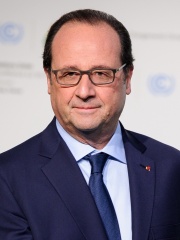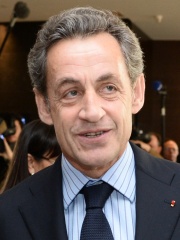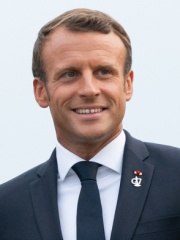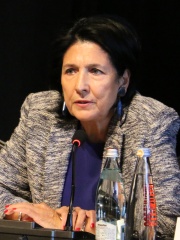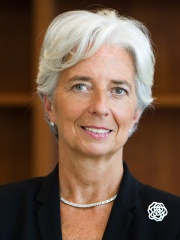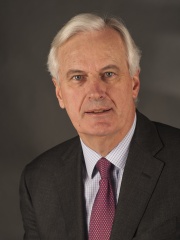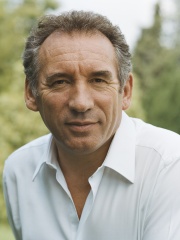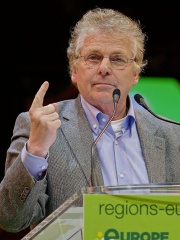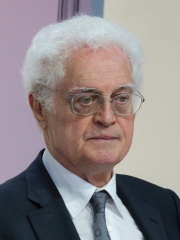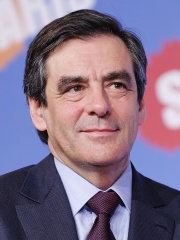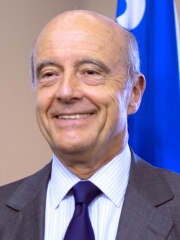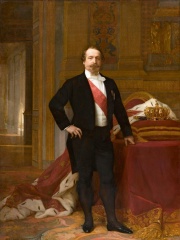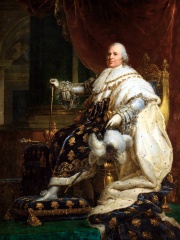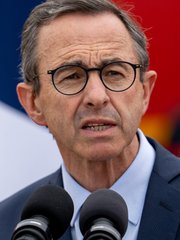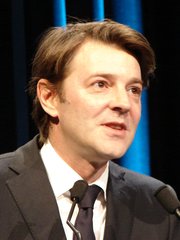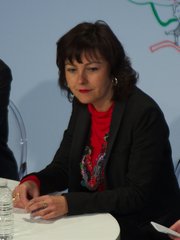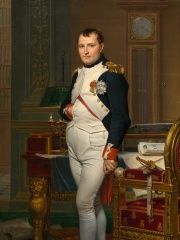

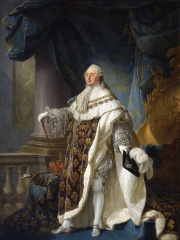
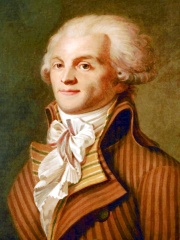
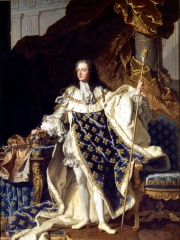
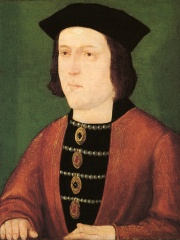
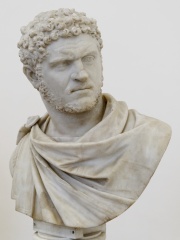
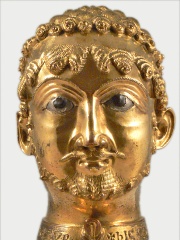
The Most Famous
POLITICIANS from France
This page contains a list of the greatest French Politicians. The pantheon dataset contains 19,576 Politicians, 981 of which were born in France. This makes France the birth place of the 3rd most number of Politicians behind United States, and Germany.
Top 10
The following people are considered by Pantheon to be the top 10 most legendary French Politicians of all time. This list of famous French Politicians is sorted by HPI (Historical Popularity Index), a metric that aggregates information on a biography's online popularity. Visit the rankings page to view the entire list of French Politicians.

1. Napoleon (1769 - 1821)
With an HPI of 95.29, Napoleon is the most famous French Politician. His biography has been translated into 214 different languages on wikipedia.
Napoleon Bonaparte (born Napoleone di Buonaparte; 15 August 1769 – 5 May 1821), later known by his regnal name Napoleon I, was a French general and statesman who rose to prominence during the French Revolution and led a series of military campaigns across Europe during the French Revolutionary and Napoleonic Wars from 1796 to 1815. He led the French Republic as First Consul from 1799 to 1804, then ruled the French Empire as Emperor of the French from 1804 to 1814, and briefly again in 1815. He was King of Italy from 1805 to 1814, Protector of the Confederation of the Rhine from 1806 to 1813, and Mediator of the Swiss Confederation from 1803 to 1813. Born on the island of Corsica to a family of Italian origin, Napoleon moved to mainland France in 1779 and was commissioned as an officer in the French Royal Army in 1785. He supported the French Revolution in 1789 and promoted its cause in Corsica. He rose rapidly through the ranks after winning the siege of Toulon in 1793 and defeating royalist insurgents in Paris on 13 Vendémiaire in 1795. In 1796, he commanded a military campaign against the Austrians and their Italian allies in the War of the First Coalition, scoring decisive victories and becoming a national hero. He led an invasion of Egypt and Syria in 1798, which served as a springboard to political power. In November 1799, Napoleon engineered the Coup of 18 Brumaire against the French Directory and became First Consul of the Republic. He won the Battle of Marengo in 1800, which secured France's victory in the War of the Second Coalition, and in 1803, he sold the territory of Louisiana to the United States. In December 1804, Napoleon crowned himself Emperor of the French, further expanding his power. The breakdown of the Treaty of Amiens led to the War of the Third Coalition by 1805. Napoleon shattered the coalition with a decisive victory at the Battle of Austerlitz, which led to the dissolution of the Holy Roman Empire. In the War of the Fourth Coalition, Napoleon defeated Prussia at the Battle of Jena–Auerstedt in 1806, marched his Grande Armée into Eastern Europe, and defeated the Russians in 1807 at the Battle of Friedland. Seeking to extend his trade embargo against Britain, Napoleon invaded the Iberian Peninsula and installed his brother Joseph as King of Spain in 1808, provoking the Peninsular War. In 1809, the Austrians again challenged France in the War of the Fifth Coalition, in which Napoleon solidified his grip over Europe after winning the Battle of Wagram. In the summer of 1812, he launched an invasion of Russia. After victory at the Battle of Borodino, he briefly occupied Moscow before conducting a catastrophic retreat of his army that winter. In 1813, Prussia and Austria joined Russia in the War of the Sixth Coalition, in which Napoleon was decisively defeated at the Battle of Leipzig. The coalition invaded France and captured Paris, forcing Napoleon to abdicate in April 1814. They exiled him to the Mediterranean island of Elba and restored the Bourbons to power. Ten months later, Napoleon escaped from Elba on a brig, landed in France with a thousand men, and marched on Paris, again taking control of the country. His opponents responded by forming a Seventh Coalition, which defeated him at the Battle of Waterloo in June 1815. Napoleon was exiled to the remote island of Saint Helena in the South Atlantic, where he died of stomach cancer in 1821, aged 51. Napoleon is considered one of the great military commanders in history, and Napoleonic tactics are still studied at military schools worldwide. His legacy endures through the modernizing legal and administrative reforms he enacted in France and Western Europe, embodied in the Napoleonic Code. He established a system of public education, abolished the vestiges of feudalism, emancipated Jews and other religious minorities, abolished the Spanish Inquisition, enacted the principle of equality before the law for an emerging middle class, and centralized state power at the expense of religious authorities. His conquests acted as a catalyst for political change and the development of nation states. However, he is controversial because of his role in wars which devastated Europe, his looting of conquered territories, and his mixed record on civil rights. He abolished the free press, ended directly elected representative government, exiled and jailed critics of his regime, reinstated slavery in French colonies, banned the entry of black people and mulattos into France, reduced the civil rights of women and children in France, reintroduced a hereditary monarchy and nobility, and violently repressed popular uprisings against his rule.

2. Louis XIV of France (1638 - 1715)
With an HPI of 93.01, Louis XIV of France is the 2nd most famous French Politician. His biography has been translated into 141 different languages.
Louis XIV (Louis-Dieudonné; 5 September 1638 – 1 September 1715), also known as Louis the Great (Louis le Grand [lwi lə ɡʁɑ̃]) or the Sun King (le Roi Soleil [lə ʁwa sɔlɛj]), was King of France from 1643 until his death in 1715. His reign of 72 years and 110 days is the longest of any monarch in history. An emblem of the age of absolutism in Europe, Louis XIV's legacy includes French colonial expansion, the conclusion of the Thirty Years' War involving the Habsburgs, and a controlling influence on the style of fine arts and architecture in France, including the transformation of the Palace of Versailles into a center of royal power and politics. Louis XIV's pageantry and opulence helped define the French Baroque style of art and architecture and promoted his image as supreme leader of France in the early modern period. Louis XIV began his personal rule of France in 1661 after the death of his chief minister Cardinal Mazarin. A believer in the divine right of kings, Louis XIV continued Louis XIII's work of creating a centralized state governed from a capital. Louis XIV sought to eliminate the remnants of feudalism persisting in parts of France by compelling many members of the nobility to reside at his lavish Palace of Versailles. In doing so, he succeeded in pacifying the aristocracy, many of whom had participated in the Fronde rebellions during his minority. He consolidated a system of absolute monarchy in France that endured until the French Revolution. Louis XIV enforced uniformity of religion under the Catholic Church. His revocation of the Edict of Nantes abolished the rights of the Huguenot Protestant minority and subjected them to a wave of dragonnades, effectively forcing Huguenots to emigrate or convert, virtually destroying the French Protestant community. During Louis' long reign, France emerged as the leading European power and regularly made war. A conflict with Spain marked his entire childhood, while during his personal rule, Louis fought three major continental conflicts, each against powerful foreign alliances: the Franco-Dutch War, the Nine Years' War, and the War of the Spanish Succession. In addition, France contested shorter wars such as the War of Devolution and the War of the Reunions. Warfare defined Louis's foreign policy, impelled by his personal ambition for glory and power: "a mix of commerce, revenge, and pique". His wars strained France's resources to the utmost, while in peacetime he concentrated on preparing for the next war. He taught his diplomats that their job was to create tactical and strategic advantages for the French military. Upon his death in 1715, Louis XIV left his great-grandson and successor, Louis XV, a powerful but war-weary kingdom, in major debt after the War of the Spanish Succession that had raged on since 1701. Some of his other notable achievements include the construction of the 240 km (150 mi) Canal du Midi in Southern France, the patronage of artists (the playwrights Molière, Racine, the man of letters Boileau, the composer and dancer Lully, the painter Le Brun and the landscape architect Le Nôtre, all contributed to the apogee of French classicism, described during his lifetime as the "Grand Siècle", or even "the century of Louis XIV"), and the founding of the French Academy of Sciences.

3. Louis XVI of France (1754 - 1793)
With an HPI of 90.50, Louis XVI of France is the 3rd most famous French Politician. His biography has been translated into 109 different languages.
Louis XVI (Louis-Auguste; French: [lwi sɛːz]; 23 August 1754 – 21 January 1793) was the last king of France before the fall of the monarchy during the French Revolution. The son of Louis, Dauphin of France (son and heir-apparent of King Louis XV), and Maria Josepha of Saxony, Louis became the new Dauphin when his father died in 1765. In 1770, he married Marie Antoinette. He became King of France and Navarre on his grandfather's death on 10 May 1774, and reigned until the abolition of the monarchy on 21 September 1792. From 1791 onwards, he used the style of king of the French. The first part of Louis XVI's reign was marked by attempts to reform the French government in accordance with Enlightenment ideas. These included efforts to increase tolerance toward non-Catholics as well as abolishing the death penalty for deserters. The French nobility reacted to the proposed reforms with hostility, and successfully opposed their implementation. Louis implemented deregulation of the grain market, advocated by his economic liberal minister Turgot, but it resulted in an increase in bread prices. In periods of bad harvests, it led to food scarcity which, during a particularly bad harvest in 1775, prompted the masses to revolt. From 1776, Louis XVI actively supported the North American colonists, who were seeking their independence from Great Britain, which was realised in the Treaty of Paris (1783). The ensuing debt and financial crisis contributed to the unpopularity of the ancien régime. This led to the convening of the Estates General of 1789. Discontent among France's middle and lower classes intensified opposition to the French aristocracy and the absolute monarchy led by Louis XVI and his wife, Marie Antoinette. Tensions progressively rose, punctuated by violent riots such as the storming of the Bastille, which forced Louis to recognize the legislative authority of the National Assembly. Louis's indecisiveness and conservatism toward the demands of the Estates led many to despise him as the embodiment of ancien régime tyranny, and his popularity deteriorated progressively. His unsuccessful flight to Varennes in June 1791 seemed to confirm suspicions that the king hoped for foreign intervention to restore his power, deeply undermining his legitimacy. Four months later, the constitutional monarchy was declared, and the replacement of the monarchy with a republic became an ever-increasing possibility. The growth of anti-clericalism among revolutionaries resulted in the abolition of the dîme (religious land tax) and several government policies aimed at the dechristianization of France. With the outbreak of civil and international war, Louis XVI was arrested during the Insurrection of 10 August 1792. One month later, the monarchy was abolished and the French First Republic was proclaimed on 21 September 1792. The former king became a desacralized French citizen, addressed as Citoyen (Citizen) Louis Capet in reference to his ancestor Hugh Capet. Louis was tried by the National Convention (self-instituted as a tribunal for the occasion), found guilty of high treason, and executed by guillotine on 21 January 1793. Louis XVI's death brought an end to more than a thousand years of continuous French monarchy. Both of his sons died in childhood, before the Bourbon Restoration; his only child to reach adulthood, Marie Thérèse, was released to her Austrian relatives in exchange for French prisoners of war, eventually dying childless in 1851.

4. Maximilien Robespierre (1758 - 1794)
With an HPI of 87.37, Maximilien Robespierre is the 4th most famous French Politician. His biography has been translated into 97 different languages.
Maximilien François Marie Isidore de Robespierre (; French: [maksimiljɛ̃ ʁɔbɛspjɛʁ]; 6 May 1758 – 28 July 1794) was a French lawyer and statesman, widely recognised as one of the most influential figures of the French Revolution. Robespierre fervently campaigned for the voting rights of all men and their unimpeded admission to the National Guard. Additionally, he advocated the right to petition, the right to bear arms in self-defence, and the abolition of the Atlantic slave trade. A radical Jacobin leader, Robespierre was elected as a deputy to the National Convention in September 1792, and in July 1793, he was appointed a member of the Committee of Public Safety. Robespierre faced growing disillusionment with other revolutionaries which led him to argue for the harsh measures of the Reign of Terror. Increasingly, members of the Convention turned against him, and accusations of excesses came to a head on 9 Thermidor. Robespierre was arrested and with around 90 others, he was executed without trial. A figure deeply divisive during his lifetime, Robespierre's views and policies continue to evoke controversy. His legacy has been heavily influenced by his actual and perceived participation in repression of the Revolution's opponents, but he is notable for his progressive views for the time. Academic and popular discourse continues to engage in debates surrounding his legacy and reputation, particularly his ideas of virtue in regards to the revolution and its violence.
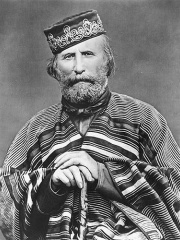
5. Giuseppe Garibaldi (1807 - 1882)
With an HPI of 87.09, Giuseppe Garibaldi is the 5th most famous French Politician. His biography has been translated into 110 different languages.
Giuseppe Maria Garibaldi ( GARR-ib-AHL-dee, Italian: [dʒuˈzɛppe ɡariˈbaldi] ; 4 July 1807 – 2 June 1882) was an Italian general, revolutionary and republican. He contributed to the Unification of Italy (Risorgimento) and the creation of the Kingdom of Italy. He is considered to be one of Italy's "fathers of the fatherland", along with Camillo Benso di Cavour, King Victor Emmanuel II and Giuseppe Mazzini. Garibaldi is also known as the "Hero of the Two Worlds" because of his military enterprises in South America and Europe. Garibaldi was a follower of the Italian nationalist Mazzini and embraced the republican nationalism of the Young Italy movement. He became a supporter of Italian unification under a democratic republican government. However, breaking with Mazzini, he pragmatically allied himself with the monarchist Cavour and Kingdom of Sardinia in the struggle for independence, subordinating his republican ideals to his nationalist ones until Italy was unified. After participating in an uprising in Piedmont, he was sentenced to death, but escaped and sailed to South America, where he spent 14 years in exile, during which he took part in several wars and learned the art of guerrilla warfare. In 1835 he joined the rebels known as the Ragamuffins (farrapos), in the Ragamuffin War in Brazil, and took up their cause of establishing the Riograndense Republic and later the Catarinense Republic. Garibaldi also became involved in the Uruguayan Civil War, raising an Italian force known as Redshirts, and is still celebrated as an important contributor to Uruguay's reconstitution. In 1848, Garibaldi returned to Italy and commanded and fought in military campaigns that eventually led to Italian unification. The provisional government of Milan made him a general and the Minister of War promoted him to General of the Roman Republic in 1849. When the war of independence broke out in April 1859, he led his Hunters of the Alps in the capture of major cities in Lombardy, including Varese and Como, and reached the frontier of South Tyrol; the war ended with the acquisition of Lombardy. The following year, 1860, he led the Expedition of the Thousand on behalf of, and with the consent of, Victor Emmanuel II, King of Sardinia. The expedition was a success and concluded with the annexation of Sicily, Southern Italy, Marche and Umbria to the Kingdom of Sardinia before the creation of a unified Kingdom of Italy on 17 March 1861. His last military campaign took place during the Franco-Prussian War as commander of the Army of the Vosges. Garibaldi became an international figurehead for national independence and republican ideals, and is considered by twentieth-century historiography and popular culture as Italy's greatest national hero. He was showered with admiration and praise by many contemporary intellectuals and political figures, including Abraham Lincoln, William Brown, Francesco de Sanctis, Victor Hugo, Alexandre Dumas, Malwida von Meysenbug, George Sand, Charles Dickens, and Friedrich Engels. Garibaldi also inspired later figures like Jawaharlal Nehru and Che Guevara. Historian A. J. P. Taylor called him "the only wholly admirable figure in modern history". The volunteers who followed Garibaldi during his campaigns were known as the Garibaldini or Redshirts, after the color of the shirts that they wore in lieu of a uniform.

6. Louis XV of France (1710 - 1774)
With an HPI of 86.93, Louis XV of France is the 6th most famous French Politician. His biography has been translated into 93 different languages.
Louis XV (15 February 1710 – 10 May 1774), known as Louis the Beloved (French: le Bien-Aimé), was King of France from 1 September 1715 until his death in 1774. He succeeded his great-grandfather Louis XIV at the age of five. Until he reached maturity (then defined as his 13th birthday) in 1723, the kingdom was ruled by his grand-uncle Philippe II, Duke of Orléans, as Regent of France. Cardinal Fleury was chief minister from 1726 until his death in 1743, at which time the king took sole control of the kingdom. His reign of almost 59 years (from 1715 to 1774) was the second longest in the history of France, exceeded only by his predecessor, Louis XIV, who had ruled for 72 years (from 1643 to 1715). In 1748, Louis returned the Austrian Netherlands, won at the Battle of Fontenoy of 1745. He ceded New France in North America to Great Britain and Spain at the conclusion of the disastrous Seven Years' War in 1763. He incorporated the territories of the Duchy of Lorraine and the Corsican Republic into the Kingdom of France. Historians generally criticize his reign, citing how reports of his corruption embarrassed the monarchy, while his wars drained the treasury and produced little gain. However, a minority of scholars argue that he was popular during his lifetime, but that his reputation was later blackened by revolutionary propaganda. His grandson and successor Louis XVI inherited a kingdom on the brink of financial disaster and gravely in need of political reform, laying the groundwork for the French Revolution of 1789.

7. Edward IV of England (1442 - 1483)
With an HPI of 86.91, Edward IV of England is the 7th most famous French Politician. His biography has been translated into 74 different languages.
Edward IV (28 April 1442 – 9 April 1483) was King of England from 4 March 1461 to 3 October 1470, then again from 11 April 1471 until his death in 1483. He was a central figure in the Wars of the Roses, a series of civil wars in England fought between the Yorkist and Lancastrian factions between 1455 and 1487. Edward inherited the Yorkist claim to the throne at the age of eighteen when his father, Richard, Duke of York, was killed at the Battle of Wakefield in December 1460. After defeating Lancastrian armies at Mortimer's Cross and Towton in early 1461, he deposed King Henry VI and took the throne. His marriage to Elizabeth Woodville in 1464 led to conflict with his chief advisor, Richard Neville, Earl of Warwick, known as the "Kingmaker". In 1470, a revolt led by Warwick and Edward's brother George, Duke of Clarence, briefly re-installed Henry VI. Edward fled to Flanders, where he gathered support and invaded England in March 1471; after victories at the battles of Barnet and Tewkesbury (where both the Earl of Warwick and Edward of Westminster, Prince of Wales, were killed), he resumed the throne. Shortly afterwards, Henry VI was found dead in the Tower of London, possibly killed on Edward's orders. Despite facing an overseas threat from Henry Tudor, the last remaining Lancastrian claimant, Edward reigned in relative peace for the next twelve years. However, he nearly restarted the Hundred Years' War, following his invasion of France in 1475, but was assuaged by Louis XI in the Treaty of Picquigny. This diplomatic agreement formally ended the Hundred Years' War, which had been in abeyance since 1453. Following his sudden death in April 1483, Edward was briefly succeeded by his son Edward V. He had appointed his younger brother, Richard, Duke of Gloucester, Lord Protector of England for the duration of the new king's minority. However, Edward V and his younger brother Richard, Duke of York, disappeared shortly after and their uncle seized the throne as Richard III.

8. Caracalla (188 - 217)
With an HPI of 86.14, Caracalla is the 8th most famous French Politician. His biography has been translated into 85 different languages.
Marcus Aurelius Antoninus (born Lucius Septimius Bassianus, 4 April 188 – 8 April 217), better known by his nickname Caracalla (; Latin: [karaˈkalːa]), was Roman emperor from 198 to 217 AD, first serving as nominal co-emperor under his father and then ruling alone after 211 AD. He was a member of the Severan dynasty, the elder son of Emperor Septimius Severus and Empress Julia Domna. Severus proclaimed Caracalla co-ruler in 198, doing the same with his other son Geta in 209. The two brothers briefly shared power after their father's death in 211, but Caracalla soon had Geta murdered by the Praetorian Guard and became sole ruler of the Roman Empire. Julia Domna had a significant share in governance, since Caracalla found administration to be mundane. His reign featured domestic instability and external invasions by the Germanic peoples. Caracalla issued the Antonine Constitution (Latin: Constitutio Antoniniana), also known as the Edict of Caracalla, which granted Roman citizenship to all free men throughout the Roman Empire. The edict gave all the enfranchised men Caracalla's adopted praenomen and nomen: "Marcus Aurelius". Other landmarks of his reign were the construction of the Baths of Caracalla, the second-largest bathing complex in the history of Rome, the introduction of a new Roman currency named the antoninianus, a sort of double denarius, and the massacres he ordered, both in Rome and elsewhere in the empire. In 216, Caracalla began a campaign against the Parthian Empire. He did not see this campaign through to completion due to his assassination by a disaffected soldier in 217. Macrinus succeeded him as emperor three days later. The ancient sources portray Caracalla as a cruel tyrant; his contemporaries Cassius Dio (c. 155 – c. 235) and Herodian (c. 170 – c. 240) present him as a soldier first and an emperor second. In the 12th century, Geoffrey of Monmouth started the legend of Caracalla's role as king of Britain. Later, in the 18th century, the works of French painters revived images of Caracalla due to apparent parallels between Caracalla's tyranny and that ascribed to French King Louis XVI (r. 1774–1792). Modern works continue to portray Caracalla as an evil ruler, painting him as one of the most tyrannical of all Roman emperors.

9. Frederick I, Holy Roman Emperor (1122 - 1190)
With an HPI of 85.83, Frederick I, Holy Roman Emperor is the 9th most famous French Politician. His biography has been translated into 90 different languages.
Frederick Barbarossa (December 1122 – 10 June 1190), also known as Frederick I (German: Friedrich I; Italian: Federico I), was the Holy Roman Emperor from 1155 until his death in 1190. He was elected King of Germany in Frankfurt on 4 March 1152 and crowned in Aachen on 9 March 1152. He was crowned King of Italy on 24 April 1155 in Pavia and emperor by Pope Adrian IV on 18 June 1155 in Rome. Two years later, the term sacrum ("holy") first appeared in a document in connection with his empire. He was later formally crowned King of Burgundy, at Arles on 30 June 1178. His nickname of Barbarossa (meaning "Red Beard" in Italian) "was first used by the Florentines only in 1298 to differentiate the emperor from his grandson, Frederick II ... and was never employed in medieval Germany" (the colour red was "also associated in the Middle Ages with malice and a hot temper"; in reality, Frederick's hair was "blond", although his beard was described by a contemporary as "reddish"). In German, he was known as Kaiser Rotbart, which in English means "Emperor Redbeard". The prevalence of the Italian nickname, even in later German usage, reflects the centrality of the Italian campaigns under his reign, and "remains to this day one of the [most] powerful historical monikers." Frederick was by inheritance Duke of Swabia (1147–1152, as Frederick III) before his imperial election in 1152. He was the son of Duke Frederick II of the Hohenstaufen dynasty and Judith, daughter of Henry IX, Duke of Bavaria, from the rival House of Welf. Frederick, therefore, descended from the two leading families in Germany, making him an acceptable choice for the Empire's prince-electors. Frederick joined the Third Crusade and opted to travel overland to the Holy Land. In 1190, Frederick drowned attempting to cross the Saleph River, leading to most of his army abandoning the Crusade before reaching Acre. Historians consider him among the Holy Roman Empire's greatest medieval emperors. He combined qualities that made him appear almost superhuman to his contemporaries: his longevity, his ambition, his extraordinary skills at organization, his battlefield acumen, and his political perspicacity. His contributions to Central European society and culture include the re-establishment of the Corpus Juris Civilis, or the Roman rule of law, which counterbalanced the papal power that had dominated the German states since the conclusion of the Investiture controversy. Due to his popularity and notoriety, in the 19th and early 20th centuries, he was used as a political symbol by many movements and regimes: the Risorgimento, the Wilhelmine government in Germany (especially under Emperor Wilhelm I), and the Nazi movement (Operation Barbarossa, Barbarossa decree) resulting in mixed legacies. Modern researchers, while exploring the legacy of Frederick, attempt to untangle legend from historical reality—these efforts result in new perspectives on both the emperor as a person and the social developments associated with him.
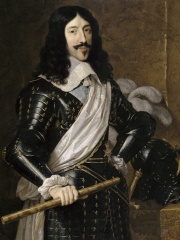
10. Louis XIII of France (1601 - 1643)
With an HPI of 85.19, Louis XIII of France is the 10th most famous French Politician. His biography has been translated into 84 different languages.
Louis XIII (French pronunciation: [lwi tʁɛz]; sometimes called the Just; 27 September 1601 – 14 May 1643) was King of France from 1610 until his death in 1643 and King of Navarre (as Louis II) from 1610 to 1620, when the crown of Navarre was merged with the French crown. Shortly before his ninth birthday, Louis became king of France and Navarre after his father Henry IV was assassinated. His mother, Marie de' Medici, acted as regent during his minority. Mismanagement of the kingdom and ceaseless political intrigues by Marie and her Italian favourites led the young king to take power in 1617 by exiling his mother and executing her followers, including Concino Concini, the most influential Italian at the French court. Louis XIII, taciturn and suspicious, relied heavily on his chief ministers, first Charles d'Albert, duc de Luynes and then Cardinal Richelieu, to govern the Kingdom of France. The King and the Cardinal are remembered for establishing the Académie française, and ending the revolt of the French nobility. They systematically destroyed the castles of defiant lords, and denounced the use of private violence (dueling, carrying weapons, and maintaining private armies). By the end of the 1620s, Richelieu had established "the royal monopoly of force" as the ruling doctrine. The king's reign was also marked by the struggles against the Huguenots and Habsburg Spain.
People
Pantheon has 981 people classified as French politicians born between 101 BC and 1995. Of these 981, 143 (14.58%) of them are still alive today. The most famous living French politicians include François Hollande, Nicolas Sarkozy, and Emmanuel Macron. The most famous deceased French politicians include Napoleon, Louis XIV of France, and Louis XVI of France. As of April 2024, 19 new French politicians have been added to Pantheon including Bruno Retailleau, François Baroin, and Olivier Faure.
Living French Politicians
Go to all RankingsFrançois Hollande
1954 - Present
HPI: 80.59
Nicolas Sarkozy
1955 - Present
HPI: 79.57
Emmanuel Macron
1977 - Present
HPI: 75.95
Salome Zourabichvili
1952 - Present
HPI: 75.74
Christine Lagarde
1956 - Present
HPI: 73.55
Marine Le Pen
1968 - Present
HPI: 72.53
Michel Barnier
1951 - Present
HPI: 71.49
François Bayrou
1951 - Present
HPI: 70.34
Daniel Cohn-Bendit
1945 - Present
HPI: 68.22
Lionel Jospin
1937 - Present
HPI: 68.14
François Fillon
1954 - Present
HPI: 67.09
Alain Juppé
1945 - Present
HPI: 65.95
Deceased French Politicians
Go to all RankingsNapoleon
1769 - 1821
HPI: 95.29
Louis XIV of France
1638 - 1715
HPI: 93.01
Louis XVI of France
1754 - 1793
HPI: 90.50
Maximilien Robespierre
1758 - 1794
HPI: 87.37
Giuseppe Garibaldi
1807 - 1882
HPI: 87.09
Louis XV of France
1710 - 1774
HPI: 86.93
Edward IV of England
1442 - 1483
HPI: 86.91
Caracalla
188 - 217
HPI: 86.14
Frederick I, Holy Roman Emperor
1122 - 1190
HPI: 85.83
Louis XIII of France
1601 - 1643
HPI: 85.19
Napoleon III
1808 - 1873
HPI: 85.06
Louis XVIII of France
1755 - 1824
HPI: 84.65
Newly Added French Politicians (2025)
Go to all RankingsBruno Retailleau
1960 - Present
HPI: 57.03
François Baroin
1965 - Present
HPI: 51.44
Olivier Faure
1968 - Present
HPI: 50.31
Jean-Noël Barrot
1983 - Present
HPI: 48.04
Raphaël Glucksmann
1979 - Present
HPI: 47.26
Agnès Pannier-Runacher
1974 - Present
HPI: 45.10
Oumar Tatam Ly
1963 - Present
HPI: 44.54
Carole Delga
1971 - Present
HPI: 44.25
Clémentine Autain
1973 - Present
HPI: 44.17
Florian Philippot
1981 - Present
HPI: 43.62
Amélie de Montchalin
1985 - Present
HPI: 42.29
Benjamin Griveaux
1977 - Present
HPI: 42.05
Overlapping Lives
Which Politicians were alive at the same time? This visualization shows the lifespans of the 25 most globally memorable Politicians since 1700.

